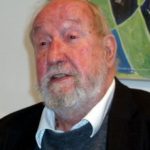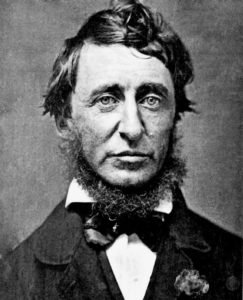We Need Their Voices Today! (12) Henry David Thoreau
TRANSCEND MEMBERS, 11 Sep 2017
John Scales Avery, Ph.D. – TRANSCEND Media Service
Introduction
This is a collection of biographical sketches showing people whose wise voices from the past can help to guide us today. All of the women and men, brief glimpses of whose lives and ideas are portrayed here, gave a high place to compassion. None of them was a slave to greed. We need their voices today!
[Note from TMS editor: It will be posted one biographical sketch per week]
**********************************************
In the distant future (and perhaps even in the not-so-distant future) industrial civilization will need to abandon its relentless pursuit of unnecessary material goods and economic growth. Modern society will need to re-establish a balanced and harmonious relationship with nature. In preindustrial societies harmony with nature is usually a part of the cultural tradition. In our own time, the same principle has become central to the ecological counter-culture while the main-stream culture thunders blindly ahead, addicted to wealth, power and growth.
In the 19th century the American writer, Henry David Thoreau (1817-1862), pioneered the concept of a simple life, in harmony with nature. Today, his classic book, Walden, has become a symbol for the principles of ecology, simplicity, and respect for nature.
Thoreau was born in Concord Massachusetts, and he attended Harvard from 1833 to 1837. After graduation, he returned home, worked in his family’s pencil factory, did odd jobs, and for three years taught in a progressive school founded by himself and his older brother, John. When John died of lockjaw in 1842, Henry David was so saddened that he felt unable to continue the school alone.
Nonviolent civil disobedience
Thoreau refused to pay his poll tax because of his opposition to the Mexican War and to the institution of slavery. Because of his refusal to pay the tax (which was in fact a very small amount) he spent a night in prison. To Thoreau’s irritation, his family paid the poll tax for him and he was released. He then wrote down his ideas on the subject in an essay entitled “The Duty of Civil Disobedience”, where he maintains that each person has a duty to follow his own individual conscience even when it conflicts with the orders of his government.
In his essay, Thoreau said: “A common and natural result of an undue respect for law is that you may see a file of soldiers, colonel, captain, corporal, privates, powder-monkeys, and all marching in admirable order over hill and dale to the wars, against their wills, ay, against their common sense and consciences, which makes it very steep marching indeed, and produces a palpitation of the heart. They have no doubt that it is a damnable business in which they are concerned; they are all peaceably inclined. Now, what are they? Men at all? or small movable forts and magazines, at the service of some unscrupulous man in power?”
“Under a government that which imprisons any unjustly”, Thoreau wrote, “the true place for a just man is in prison.” Civil Disobedience influenced Tolstoy, Gandhi and Martin Luther King, and it anticipated the Nuremberg Principles.
Harmony with nature
Thoreau became the friend and companion of the transcendentalist writer Ralph Waldo Emerson (1803 1882), who introduced him to a circle of writers and thinkers that included Ellery Channing, Margaret Fuller and Nathanial Hawthorne.
Nathanial Hawthorne described Thoreau in the following words: “Mr. Thorow [sic] is a keen and delicate observer of nature, a genuine observer, which, I suspect, is almost as rare a character as even an original poet; and Nature, in return for his love, seems to adopt him as her especial child, and shows him secrets which few others are allowed to witness. He is familiar with beast, fish, fowl, and reptile, and has strange stories to tell of adventures, and friendly passages with these lower brethren of mortality. Herb and flower, likewise, wherever they grow, whether in garden, or wild wood, are his familiar friends. He is also on intimate terms with the clouds and can tell the portents of storms. It is a characteristic trait, that he has a great regard for the memory of the Indian tribes, whose wild life would
have suited him so well; and strange to say, he seldom walks over a plowed field without picking up an arrow-point, a spear-head, or other relic of the red men, as if their spirits willed him to be the inheritor of their simple wealth.”
Walden, an experiment in simple living
At Emerson’s suggestion, Thoreau opened a journal, in which he recorded his observations concerning nature and his other thoughts. Ultimately the journal contained more than 2 million words. Thoreau drew on his journal when writing his books and essays, and in recent years, many previously unpublished parts of his journal have been printed.
From 1845 until 1847, Thoreau lived in a tiny cabin that he built with his own hands. The cabin was in a second-growth forest beside Walden Pond in Concord, on land that belonged to Emerson. Thoreau regarded his life there as an experiment in simple living. He described his life in the forest and his reasons for being there in his book Walden,
“Most of the luxuries”, Thoreau wrote, “and many of the so-called comforts of life, are not only not indispensable, but positive hindrances to the elevation of mankind. With respect to luxuries, the wisest have ever lived a more simple and meager life than the poor. The ancient philosophers, Chinese, Hindoo, Persian, and Greek, were a class than which was in a more simple and meager life than the poor. The ancient philosophers, Chinese, Hindoo, Persian, and Greek, were a class than which none has been poorer in outward riches, none so rich in inward.”
Elsewhere in Walden, Thoreau remarks, “It is never too late to give up your prejudices”, and he also says, “Why should we be in such desperate haste to succeed, and in such desperate enterprises? ” Other favorite quotations from Thoreau include “Beware of all enterprises that require new clothes”, and “Men have become tools of their tools.”
Thoreau’s closeness to nature can be seen from the following passage, written by his friend Frederick Willis, who visited him at Walden Pond in 1847, together with the Alcott family: “He was talking to Mr. Alcott of the wild flowers in Walden woods when, suddenly stopping, he said: ‘Keep very still and I will show you my family.’ Stepping quickly outside the cabin door, he gave a low and curious whistle; immediately a woodchuck came running towards him from a nearby burrow. With varying note, yet still low and strange, a pair of gray squirrels were summoned and approached him fearlessly. With still another note several birds, including two crows flew towards him, one of the crows nestling upon his shoulder. I remember that it was the crow resting close to his head that made the most vivid impression on me, knowing how fearful of man this bird is. He fed them all from his hand, taking food from his pocket, and petted them gently before our delighted gaze; and then dismissed them by different whistling, always strange and low and short, each wild thing departing instantly at hearing his special signal.”
Thoreau’s views on religion
Towards the end of his life, when he was very ill, someone asked Thoreau whether he had made his peace with God. “We never quarreled”, he answered.
In an essay published by the Atlantic Monthly in 1853, Thoreau described a pine tree in Maine with the words: “It is as immortal as I am, and perchance will go to as high a heaven, there to tower above me still.” However, the editor (James Russell Lowell) considered the sentence to be blasphemous, and removed it from Thoreau’s essay before publication.
In one of his essays, Thoreau wrote: “If a man walk in the woods for love of them half of each day, he is in danger of being regarded as a loafer; but if he spends his whole day as a speculator, shearing off those woods and making the earth bald before her time, he is esteemed an industrious and enterprising citizen.”
A few more things that Thoreau said:
“It is the beauty within us that makes it possible for us to recognize the beauty around us. The question is not what you look at, but what you see.”
“Simplify your life. Don’t waste the years struggling for things that are unimportant. Don’t burden yourself with possessions. Keep your needs and wants simple and enjoy what you have. Don’t destroy your peace of mind by looking back, worrying about the past. Live in the present. Simplify!”
“Go confidently in the direction of your dreams. Live the life you’ve imagined.”
“Happiness is like a butterfly; the more you chase it, the more it will elude you, but if you turn your attention to other things, it will come and sit softly on your shoulder.”
“Rather than love, than money, than fame, give me truth.”
“The mass of men lead lives of quiet desperation.”
”You must live in the present, launch yourself on every wave, find your eternity in each moment. Fools stand on their island of opportunities and look toward another land. There is no other land; there is no other life but this.”
“Be not simply good, be good for something,”
“Books are the treasured wealth of the world and the fit inheritance of generations and nations.”
“If you have built castles in the air, your work need not be lost; that is where they should be. Now put the foundations under them.”
“If a man does not keep pace with his companions, perhaps it is because he hears a different drummer. Let him step to the music he hears, however measured or far away.”
“The greatest compliment that was ever paid me was when one asked me what I thought, and attended to my answer.”
“We need the tonic of wildness…At the same time that we are earnest to explore and learn all things, we require that all things be mysterious and unexplorable, that land and sea be indefinitely wild, unsurveyed and unfathomed by us because unfathomable. We can never have enough of nature.”
Henry David Thoreau, pioneer of nonviolent civil disobedience, pioneer of environmentalism, we need your voice today!
Contents:
12 Henry David Thoreau
13 Count Leo Tolstoy
14 Mahatma Gandhi
15 Martin Luther King
16 Wilfred Owen
17 Albert Einstein
18 Edna St. Vincent Millay
19 Bertha von Suttner
20 George Orwell
21 Helen Keller
22 We need their voices, and yours!
________________________________________________
 John Scales Avery, Ph.D., who was part of a group that shared the 1995 Nobel Peace Prize for their work in organizing the Pugwash Conferences on Science and World Affairs, is a member of the TRANSCEND Network and Associate Professor Emeritus at the H.C. Ørsted Institute, University of Copenhagen, Denmark. He is chairman of both the Danish National Pugwash Group and the Danish Peace Academy and received his training in theoretical physics and theoretical chemistry at M.I.T., the University of Chicago and the University of London. He is the author of numerous books and articles both on scientific topics and on broader social questions. His most recent books are Information Theory and Evolution and Civilization’s Crisis in the 21st Century (pdf).
John Scales Avery, Ph.D., who was part of a group that shared the 1995 Nobel Peace Prize for their work in organizing the Pugwash Conferences on Science and World Affairs, is a member of the TRANSCEND Network and Associate Professor Emeritus at the H.C. Ørsted Institute, University of Copenhagen, Denmark. He is chairman of both the Danish National Pugwash Group and the Danish Peace Academy and received his training in theoretical physics and theoretical chemistry at M.I.T., the University of Chicago and the University of London. He is the author of numerous books and articles both on scientific topics and on broader social questions. His most recent books are Information Theory and Evolution and Civilization’s Crisis in the 21st Century (pdf).
This article originally appeared on Transcend Media Service (TMS) on 11 Sep 2017.
Anticopyright: Editorials and articles originated on TMS may be freely reprinted, disseminated, translated and used as background material, provided an acknowledgement and link to the source, TMS: We Need Their Voices Today! (12) Henry David Thoreau, is included. Thank you.
If you enjoyed this article, please donate to TMS to join the growing list of TMS Supporters.

This work is licensed under a CC BY-NC 4.0 License.

